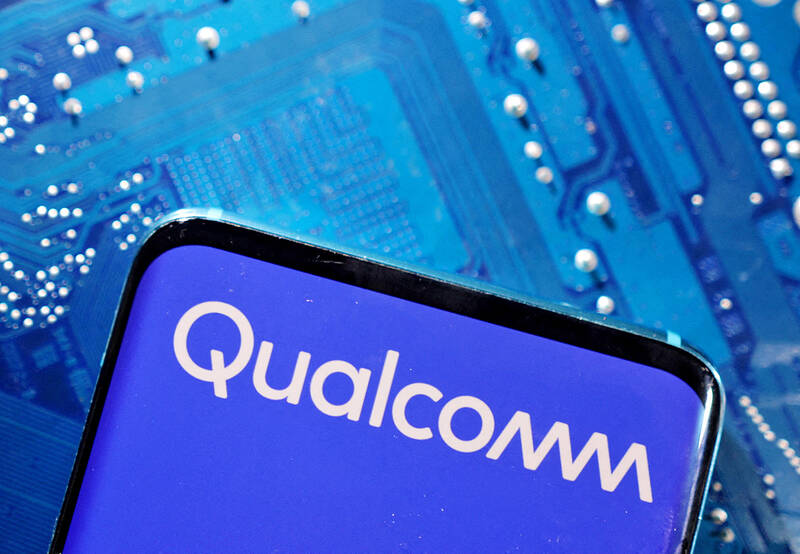Qualcomm Inc, the world’s biggest seller of smartphone processors, gave an upbeat forecast for sales and profit in the current period, suggesting demand for handsets is increasing after a two-year slump.
Revenue in the three months ended in June will be US$8.8 billion to US$9.6 billion, the company said in a statement Wednesday. Excluding certain items, earnings will be US$2.15 to US$2.35 a share. Analysts had projected sales of US$9.08 billion and earnings of US$2.16 a share.
The outlook signals that the smartphone market has begun to bounce back, tracking with Qualcomm’s forecast that demand would gradually recover this year. The San Diego-based company also reported better-than-predicted results in the January-to-March quarter — buoyed by headway in China, where it sells technology to local phone manufacturers.

Photo: Reuters
In the March quarter, profit was US$2.44 a share, excluding some items. Revenue rose 1 percent to US$9.39 billion. Analysts had estimated profit of US$2.32 and sales of US$9.32 billion.
Revenue from the smartphone segment gained 1 percent last quarter, a slowdown from the 16 percent increase in the previous three months.
But China was a bright spot, as sales to phone makers in that country, the biggest market for the devices, surged 40 percent in the first half of the fiscal year, “reflecting our strong competitive positioning and recovery of demand,” the company said.
In that market, Qualcomm chief executive officer Cristiano Amon said customers, including Xiaomi Corp (小米), Honor Terminal Co (榮耀), OnePlus Technology Co (萬普拉斯科技), Oppo and Vivo Communication Technology Co (維沃), are fueling demand. They’re not losing smartphone market share to a resurgent Huawei Technologies Co (華為) in China, he added.
Amon said that Huawei’s reentry into the market has helped stoke interest in the Android operating system, which is often paired with Qualcomm chips.
“We have not seen signs of weakness in the Android premium market in China,” he said.
Huawei has been blacklisted by the US government, and Amon pointed out that Qualcomm only sells less-advanced 4G phone parts to the company — in line with US trade restrictions. His company expects that business to wind down to nothing next year.
Apple Inc and Samsung Electronics Co are major phone customers of Qualcomm. But Apple’s iPhone relies on Qualcomm for connectivity chips, rather than the main processor.
Qualcomm’s Internet of Things group, which creates electronics for Web-connected appliances, has suffered from a glut of inventory. Revenue at that unit was down 11 percent last quarter. Qualcomm’s automotive sales rose 35 percent.
An additional portion of Qualcomm’s profit comes from licensing the fundamental technology that underpins all modern mobile networks. Phone manufacturers pay these fees whether they use Qualcomm-branded chips or not.

Semiconductor business between Taiwan and the US is a “win-win” model for both sides given the high level of complementarity, the government said yesterday responding to tariff threats from US President Donald Trump. Home to the world’s largest contract chipmaker, Taiwan Semiconductor Manufacturing Co (TSMC, 台積電), Taiwan is a key link in the global technology supply chain for companies such as Apple Inc and Nvidia Corp. Trump said on Monday he plans to impose tariffs on imported chips, pharmaceuticals and steel in an effort to get the producers to make them in the US. “Taiwan and the US semiconductor and other technology industries

SMALL AND EFFICIENT: The Chinese AI app’s initial success has spurred worries in the US that its tech giants’ massive AI spending needs re-evaluation, a market strategist said Chinese artificial intelligence (AI) start-up DeepSeek’s (深度求索) eponymous AI assistant rocketed to the top of Apple Inc’s iPhone download charts, stirring doubts in Silicon Valley about the strength of the US’ technological dominance. The app’s underlying AI model is widely seen as competitive with OpenAI and Meta Platforms Inc’s latest. Its claim that it cost much less to train and develop triggered share moves across Asia’s supply chain. Chinese tech firms linked to DeepSeek, such as Iflytek Co (科大訊飛), surged yesterday, while chipmaking tool makers like Advantest Corp slumped on the potential threat to demand for Nvidia Corp’s AI accelerators. US stock

The US Federal Reserve is expected to announce a pause in rate cuts on Wednesday, as policymakers look to continue tackling inflation under close and vocal scrutiny from US President Donald Trump. The Fed cut its key lending rate by a full percentage point in the final four months of last year and indicated it would move more cautiously going forward amid an uptick in inflation away from its long-term target of 2 percent. “I think they will do nothing, and I think they should do nothing,” Federal Reserve Bank of St Louis former president Jim Bullard said. “I think the

‘LASER-FOCUSED’: Trump pledged tariffs on specific sectors, including semiconductors, pharmaceuticals, steel, copper and aluminum, and perhaps even cars US President Donald Trump said he wants to enact across-the-board tariffs that are “much bigger” than 2.5 percent, the latest in a string of signals that he is preparing widespread levies to reshape US supply chains. “I have it in my mind what it’s going to be but I won’t be setting it yet, but it’ll be enough to protect our country,” Trump told reporters on Monday night. Asked about a report that incoming US Secretary of the Treasury Scott Bessent favored starting with a global rate of 2.5 percent, Trump said he did not think Bessent supported that and would not